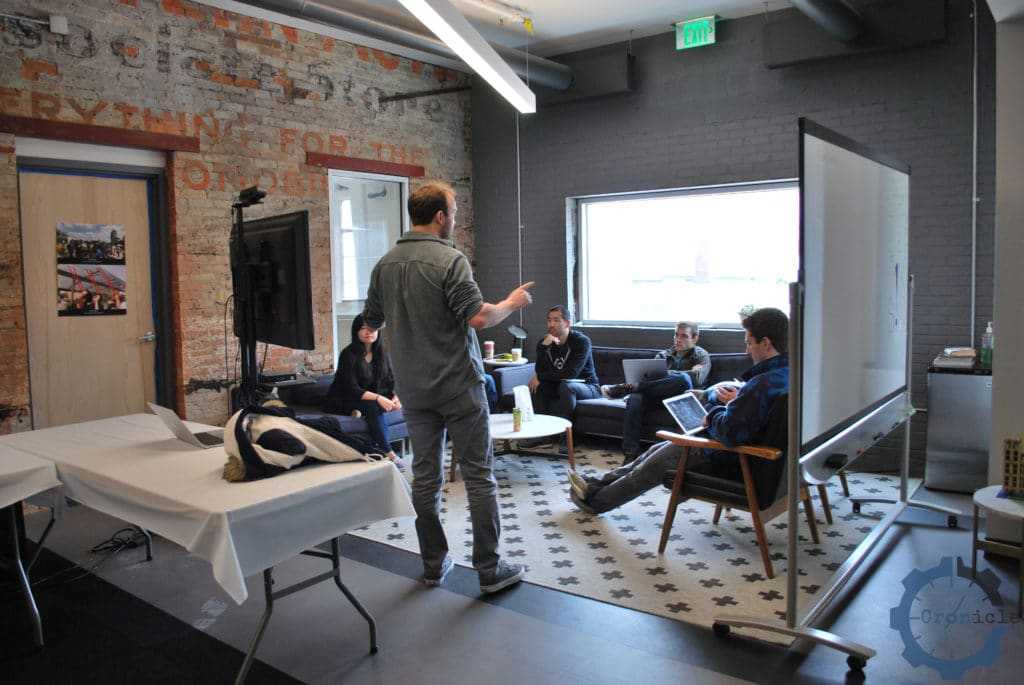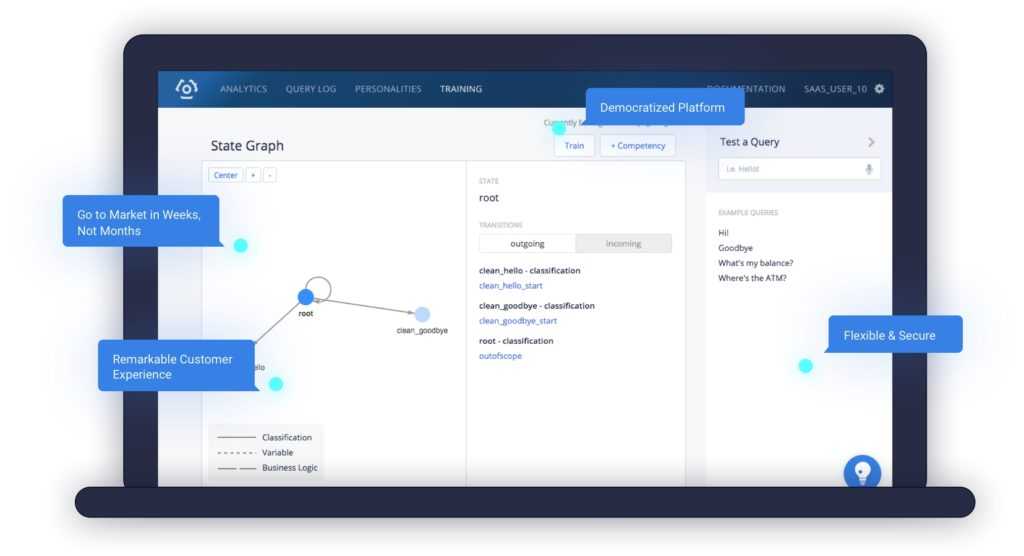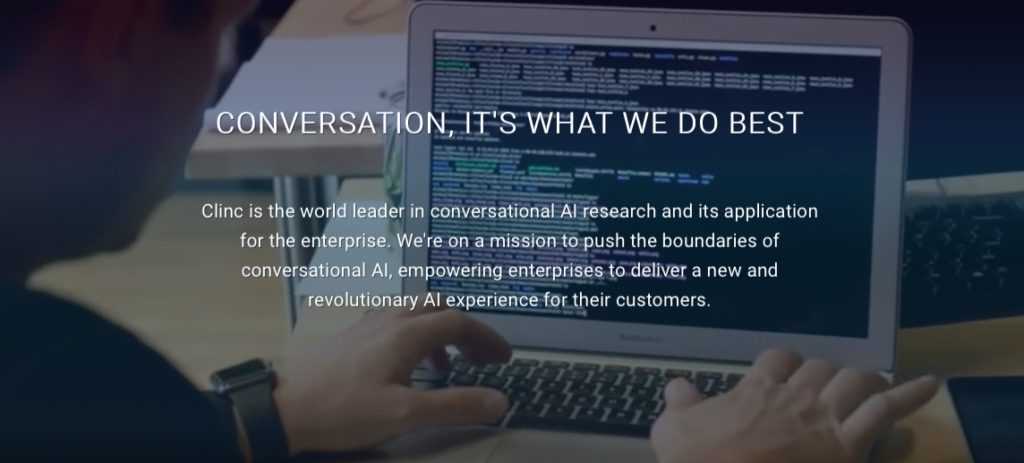Alexa, You're Fired: Why Conversational AI Startup Clinc Is Bulldozing The Competition
By Laura Cowan
Laura K. Cowan is a tech, business, and wellness journalist and fantasy author whose work has focused on promoting sustainability initiatives and helping individuals find a sense of connection with the natural world.
A Clinc meeting in progress we passed through on our tour of the Cahoots co-working space a few months ago shortly after Cronicle's launch. The team has 80-strong desks filling the top floor of the offices, and has already moved into space in Kerrytown as well.
Just a few months ago, industry-disrupting conversational AI startup Clinc, which is rolling out an automotive application of their voice-interface software in 2021, was filling the top floor of tech and startup co-working space Cahoots and filling an office in Kerrytown. Now the conversational AI research startup is expanding into a third location in Ann Arbor across from security unicorn Duo's offices next door to The Blind Pig, and launching a revolutionary banking application in Singapore with OCBC Bank, the first of its kind in the country. What makes Clinc such a fast-growing AI company compared to all the rest?
It's a little controversial how automated or natural the company's language processing is, but that's because it is so complex that it has 12 patents on the technology developed by University of Michigan professor Jason Mars and his wife professor Lingjia Tang also of the University of Michigan--who have between them won ISCA Hall of Fame awards, Google and Facebook Research Awards and a National Science Foundation’s Career award for their work.
Users can ask the Clinc interface questions about their purchase history from last month's budget, to place orders for them, or how to get to the nearest landmark. The integration across industries and contexts is one of the reasons the Clinc platform is such useful AI tech.
The entire Clinc executive team have resumes packed with impressive research. Clinc co-founder and Chief Product Officer Dr. Johann Hauswald was the creator of open-source personal assistant Sirius. All five co-founding C-suite executives have worked for Google, Intel, Facebook, Microsoft, and other companies in the AI space. Mr. Mars conducts collaborative research with IBM Watson, Google, Facebook, Intel and the National Science Foundation. The Clinc system is so disruptive to the AI space that the company is constantly racking up new awards, most recently the Frost & Sullivan's 2019 Technology Leader for Artificial Intelligence, and being featured in TechCrunch, Business Insider, The New York Times, and Forbes.
So what's all this upheaval in the conversational AI space really about? If you're in automotive, you've heard of them more recently. If you're in AI, you know that Clinc's natural language processing works without matching dictionaries of synonyms to decode voice commands, but does anyone outside the AI space really know what this company does or why this tech has an apparent edge?
https://www.youtube.com/watch?v=PaVvbLeOi3U
Jason Mars, Clinc co-founder and CEO, speaks at Tech Disrupt 2018.
Here's the back-end story: Clinc has been revolutionizing how we interact with voice-activated apps for banking, restaurants, gaming, healthcare, and now in-vehicle systems, to allow users to interact with a digital personal assistant in a way that is natural to how people really speak. You know how hilariously wrong Siri or Alexa can get your requests when you don't frame them correctly, though they are head and shoulders above first-gen systems of the same kind. The Clinc system isn't perfect either, but it's much more capable of understanding how you naturally speak. The Clinc system can process and respond to all kinds of commands outside a narrow prescribed list so it can do things like order a burger for you from your car at a nearby restaurant or fill out healthcare records by voice command. That's because it processes sentences holistically and interprets them in the way our brains do as humans, rather than parsing synonyms from a dictionary.
To really dig into this, we decided to let you see all the keynotes and explanations Clinc has been preparing for TechDisrupt 2018, Voice 2019 and the like. Director of Marketing Emma Furlong, pictured in the video below, took a moment out of yet another conference to speak with us, explaining Clinc's quick rise to dominate the conversational AI space. "It's completely data driven," she says of the Clinc platform for enterprise AI. "Rather than keyword driven."
The Clinc AI Training Platform in action.
"We can work in 80 languages because we understand language context and can learn natural language," Furlong tells us of the Clinc software, which in the TechDisrupt keynote video above parses requests for nearby gas station and restaurant recommendations and takes a custom order but still hears "Jason" as "Bacon." We ask about the slip-up, which is reminiscent of other voice assistant systems.
"We have partnerships with speech detection and recognition companies," Furlong explains, "that work converting speech to text" for the Clinc system to process. Clinc depends on the technologies these companies produce to pair with their language recognition tech to function, but it's a complex process, obviously, with so many language structures and industry contexts in play. Furlong says it's always a work in progress, but the Clinc system processes language so intuitively that it's taking over multiple industries from larger players in the space. The key is in "how long it takes to train new competencies," Furlong explains. "A new competency like food ordering can train in hours" with this system, rather than months. And the system does appear to work well. You can see in the video that the Clinc system switches seamlessly from answering questions about gas stations to restaurant ordering to inquiries about last month's expenses from a particular bank account.
How does the Clinc system work in cars, where the product development cycle for new vehicles is still in the multiple years and struggles to pair with quickly shifting tech? Clinc can't confirm exact automakers we've heard about behind the scenes, but says they're working with several OEMs and suppliers in the infotainment space by integrating AI into the companies' in-vehicle tech. Not using the tech through the entire car helps with that dev cycle. "Engineers have created a new approach for automotive AI at scale," Furlong says, though she cautions us she's only expert on the AI side and not the automotive dev process. Since cars are now connected to the internet, it makes the integration process with cloud-based tech that much easier to keep up to date in real time.
https://www.youtube.com/watch?v=zEftxzS3q4M
It goes without saying there are many competitors in this space, "but it's easier to do keyword matching approach" Furlong says of alternative systems. "The research lab at Clinc created this approach and published research papers on it, but it's not easy to pick up this approach." She says the company is an estimated 5 years ahead of its competitors, which is significant but still a gap that could be closed. "Keywords are a sure thing," Furlong says of the current market alternatives to the Clinc system, "and this approach if it doesn't work it doesn't work at all, so there is a bigger risk. It's more complicated."
https://www.youtube.com/watch?v=Ub1YyoYTyYM
Clinc at VentureBeat Transform 2019.
Clinc already has offices in Cahoots on Huron, an office in Kerrytown, and will move into the new space on First Street in early 2020. Furlong says the company is happy to be next door to Duo to have "a little friendly competition between two Ann Arbor startups," though not only do the companies not compete, but there doesn't seem to be much competition for Clinc at all, even from tech giants Google and Facebook who are already in this space. Like Duo, recently acquired for $2.3 billion by Cisco after eating everyone's lunch in the security space, up and coming Clinc is currently eating the competition for breakfast. Banking and healthcare are high-precision industries that require very accurate technology for voice applications, and if you knew how hard it was to get into the automotive space without being consumed or buried by the OEMs you would be very impressed with Clinc's success so far. We hope no corners have been cut on this rapid and complicated ascent and sincerely wish them the best.
We're impressed, all things taken together, knowing how many challenges this little company has already handled. The key will be to see if competitors can catch up any time soon, and how well the tech keeps up with other technology with which it integrates in a myriad of industries. More than anything, it's a sign that conversational AI is just beginning its coming of age and that your digital personal assistant in the future will probably be a lot more accurate (though maybe less hilarious?) to interact with than current options. It is not a simple process to manage working in half a dozen distinct industries. The Clinc website makes "AI for enterprise" sound as simple as creating a Wix website. We know it isn't, but the seamlessness of adoption with a host of new clients is speaking volumes of Clinc's success for now.
ai, ann arbor tech news, clinc, conversational ai, emma furlong, jason mars, lingjia tang, ocbc bank, tech disrupt, voice 2019





